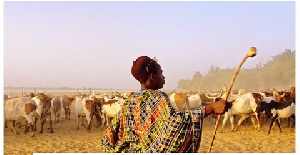 File Photo of a Fulani herdsman
File Photo of a Fulani herdsman
Dealing with the menace posed by Fulani pastoralists in Ghana, especially in the Eastern Region, is a daunting task, however, reports and research findings on the issue will be followed to ensure that lasting solutions are found, Eric Kwakye Darfour, Minister-designate for the Eastern Region, has said.
According to him, most of the cattle herded by the nomadic Fulani and raiding farms belong to Ghanaians, and a move to flush the pastoralists and the animals out, if not well thought through, could leave those Ghanaians disadvantaged.
The activities of Fulani herdsmen in the country have over the years brewed tension between them and local crop famers and these Fulani herdsmen as the transhumant settlers, in their bid to obtain forage and water for their grazing cattle, set them into farms and communal water bodies, giving rise to clashes and resultant fatalities.
Speaking in an interview with Chief Jerry Forson, host of Ghana Yensom, on Accra100.5FM on Wednesday January 25 in connection with his plans to deal with the challenge if approved by the Appointments Committee of parliament, Mr Darfour said: “We all know that cattle rearing forms part of agriculture, but how the business is carried out by the Fulani is what is creating the problems and tensions in the region and some other parts of the country.
“At this time, it will be extremely difficult to say we want to totally eradicate the Fulani menace because most of the cattle belong to Ghanaians. For this reason we need a more acceptable way of rearing the cattle.
“For instance, the population of Brazil is a little over 200 million people but the cattle over there is more than 400 million and the same can be said about Argentina, but you will never see the cattle moving around destroying people’s farms. And so we need to learn from these countries best practices in managing and rearing cattle.
“There are numerous research works and studies conducted by people to help us deal with this issue. One Professor Fianko was contacted by former President John Kufuor to conduct research into this area and that report is there. When I am approved we will have a look at that particular report and work with it to ensure that this problem is resolved.”